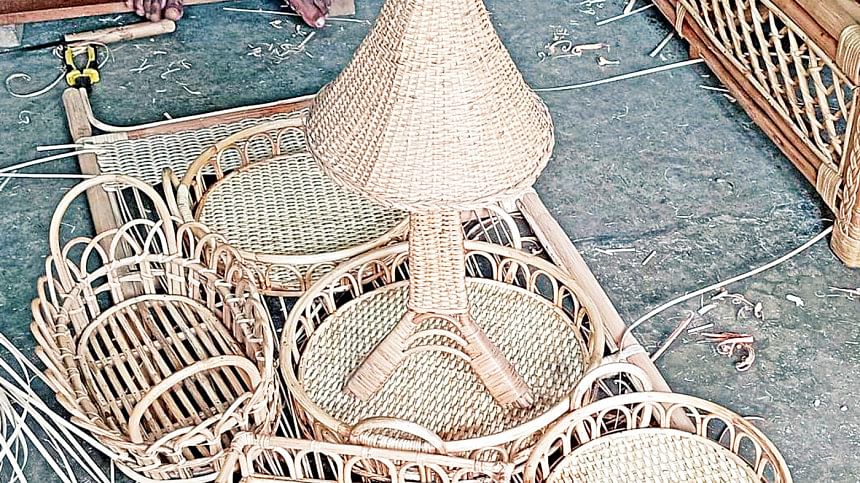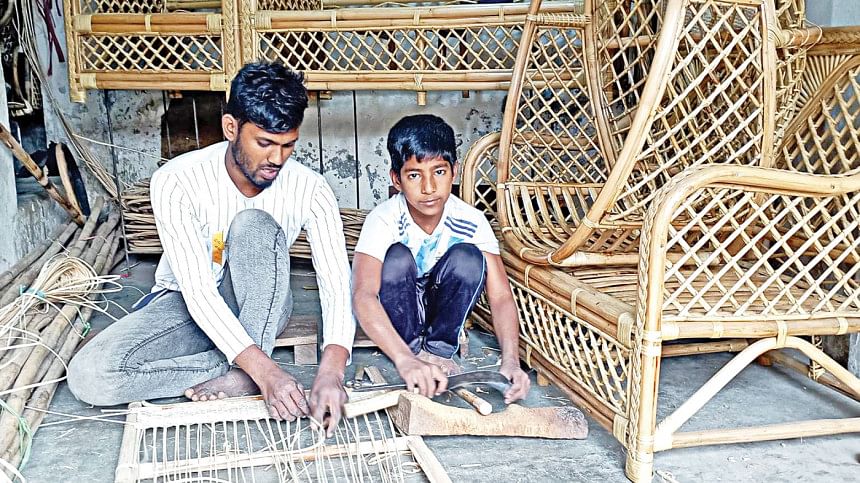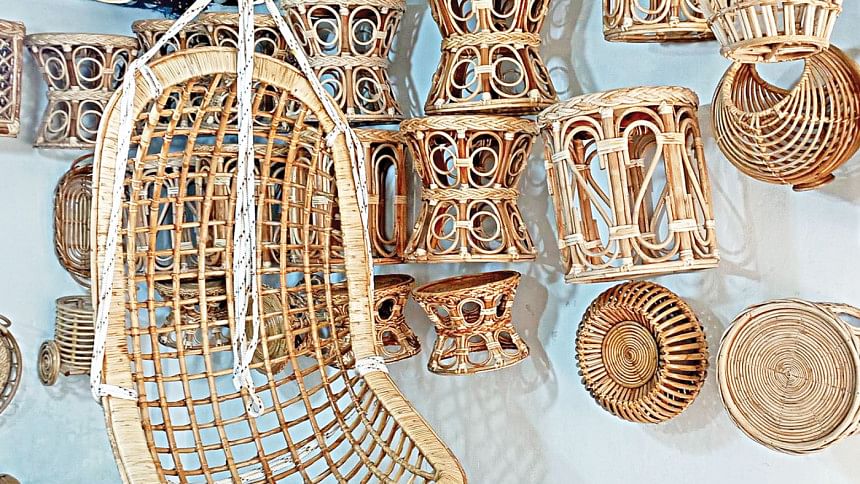Cheap and durable, cane products hold huge potential

Though plastic, plywood and board furniture have captured the market, the demand for those made from cane has not disappeared completely.
Rather, the consumption of furniture items and showpieces produced from the natural fibre is growing as customers are increasingly becoming aware of its eco-friendly feature.
"We regularly make around 20 items, including sofa sets, easy chairs, bookshelves, trays, room partitions, tables, stools and cradles. We also supply items as per designs sought by customers," said Md Sohel Mia, proprietor of Mymensingh Cane House in the divisional city. He has been running the business for 20 years.
Canes are also used to make show-pieces and they have high in good demand. People buy them as gift items, said Md Rashed Mia, also a furniture maker.
Zohir Khan, another manufacturer, says the demand for show-pieces goes up on various occasions.
A sofa set is sold between Tk 8,000 and Tk 20,000. "Such a set sofa can easily be used for 10 to 12 years. And after small repairing and varnishing, it could be used for another 10 years."
"We regularly make around 20 items, including sofa sets, easy chairs, bookshelves, trays, room partitions, tables, stools and cradles. We also supply items as per designs sought by customers."
Local furniture makers collect canes from Pabna and Khagrachhari. The raw material is also imported from Myanmar and Bhutan.
The price of cane has increased by 50 per cent within a span of a year, said Sohel.
"But we have not increased the price accordingly since customers might respond negatively."
If the supply of locally produced quality cane can be increased, the profit would go up, said industry people.

Imported canes are mainly used for making items such as sofas, chairs and tables since the quality of canes is better and they last long.
Sales are good but the profit is less as the price of cane is higher, said furniture makers while talking to this correspondent in the city's Sehora area.
Customers belonging to the middle class make up the largest base of customers of cane-made furniture and decorative items.
Also, people who work at government offices and non-government organisations and see transfer on a regular interval are among the clients since the light-weight furniture can easily be shifted from one place to another, said industry people.
The making of furniture and showpieces from cane has also created jobs.
On average, a worker earns Tk 600 a day, said Al Amin, a worker.
"Earnings are reasonable," he said, adding that workers can find jobs outside of the city as well.
Md Abdus Salam, deputy general manager of the Bangladesh Small and Cottage Industries Corporation (BSCIC) in Mymensingh, said items made from cane had a very high good demand among the well-off in the past.

"But with the flooding of cheap plastic and plywood-made products, the overall demand has gone down."
He said cane products could grow as an industry. "And it can create jobs for thousands of people, mainly in the rural areas."
If the BSCIC receives any proposal to promote cane-made products, the government agency will work on it, said the official.
M Sirajul Islam, a former professor of the agricultural economics department at the Bangladesh Agricultural University (BAU), said the promotion of cane as a small and medium industry can surely enrich the country's rural economy.
"Cane products are sophisticated items for many who prefer organic products compared to those made using iron, steel and plastic. Cane is grown on non-agricultural land. The promotion of its cultivation can support small and marginal farmers as a bonus crop."
In the past, mates that were widely available in almost all households in Bangladesh were made from the cane by the rural people, especially women, said Prof Sirajul.
There is a huge potential for cane production in Mymensingh, Sylhet, Rangpur and the hilly regions, according to AHM Saiful Islam, a professor of the agricultural economics department at the BAU.
"Due to global climate change, people are showing more interest in recyclable jute and cane items."
Both Sirajul and Saiful urged the authorities to take initiatives for the promotion of cane products since these products have high demand in overseas markets as well.

 For all latest news, follow The Daily Star's Google News channel.
For all latest news, follow The Daily Star's Google News channel. 



Comments